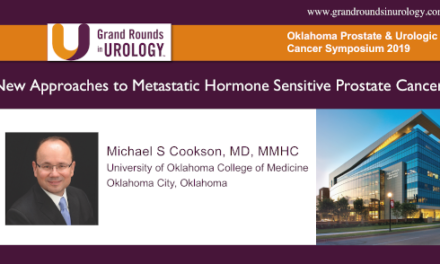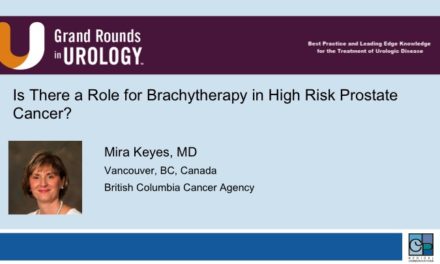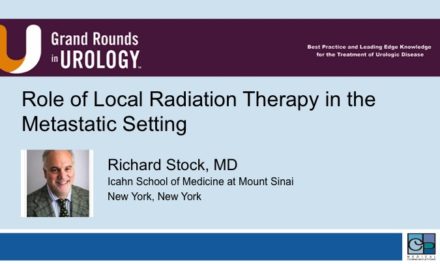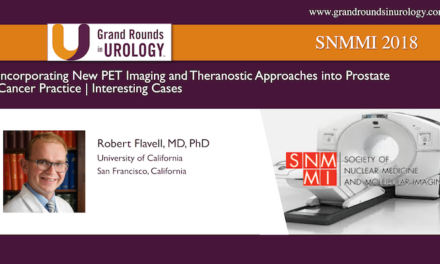Dr. Daniel P. Petrylak and Dr. Michael S. Cookson presented “Point-Counterpoint: Early Chemotherapy is Better” at the 27th annual International Prostate Cancer Update meeting on Thursday, January 26, 2017.
Keywords: prostate cancer, androgen deprivation therapy, chemotherapy, docetaxel, metastatic, PSA
How to cite: Petrylak, Daniel P. and Cookson, Michael S. “Point-Counterpoint: Early Chemotherapy is Better” January 26, 2017. Accessed Jan 2025. https://dev.grandroundsinurology.com/point-counterpoint-early-chemotherapy-better
Transcript
Point-Counterpoint: Early Chemotherapy is Better
THOMAS E. KEANE, MBBCh: This is going to be a session on advanced disease. And we’re going to start it off with a point, counterpoint question regarding early chemotherapy. We’re going to have a pro and a con. And pro is going to come from Dr. Dan Petrylak, the con from Dr. Michael Cookson. And I will ask the speakers to come up and state their points of view, please.
DANIEL P. PETRYLAK, MD: So, I’m going to be presenting the pro opinion for early chemotherapy for metastatic prostate cancer. So these are my disclosures.
It’s been actually 14 years now, 13 years since the initial presentation that docetaxel improves survival for patients with metastatic castration-resistant prostate cancer. Unfortunately, the survival benefit that we saw in castration-resistant disease was rather modest, about three months overall. And this is why in metastatic disease we reserved chemotherapy for those patients who are symptomatic, those patients who are rapidly progressive, rapidly rising PSA, doubling time of less than three months, or those patients with visceral disease who may not respond to primary hormone therapy, especially they may not respond to abiraterone or enzalutamide. We are having better ways to select out these treatments. Hopefully ARV7 will get approved which will tell us that the patient should not go on a drug such as abiraterone or enzalutamide, and you may want to favor chemotherapy in that situation.
Now, we should be considering chemotherapy for patients with extensive disease at the initiation of androgen blockade for metastatic prostate cancer. So I’m going to present the data that supports this. So Chris Sweeney ran a trial ECOG3805, which was the CHAARTED study. This was a randomized trial that took patients who had metastatic disease. They were stratified by the extent of metastases, either high versus low. And this was defined as more than four lesions on bone scan, or the presence of liver metastases, age, ECOG performance status, whether they had androgen blockade within 30 days. They were allowed to androgen blockade or at least go on chemotherapy within 4 months of starting androgen blockade. And then whether they had prior adjuvant androgen deprivation therapy along with their primary hormone therapy.
So arm A was 6 cycles of docetaxel with the standard dose of 75 mg/m2. Prednisone was not included in this regimen. And then the standard of care arm was just simple standard androgen blockade with LHRH agonist plus bicalutamide. Patients were evaluated, followed for survival and for progression. So again, as I mentioned before, these were the eligibility criteria. Prior androgen deprivation therapy was limited to 3 months prior to randomization or less than 24 months with no progression within 12 months of local therapy.
790 men were recruited between July of 2006 and November of 2012, and this trial was terminated in January of 2014 after median follow-up of 29 months. There were 136 deaths on the androgen deprivation arm, and 101 deaths on the chemotherapy arm.
So these are the survival curves based upon extent of disease. We see the biggest difference in those patients who have the extensive metastatic disease. The median survival for the combination therapy was about 50 months. It was 32 months for the androgen deprivation therapy alone. Interestingly, the low-volume disease at the first analysis did not show a significant difference in survival. And in fact, Chris Sweeney updated this data at the European Society for Medical Oncology (ESMO) meeting back last fall, and this continued to be almost superimposable. So the low-volume disease patients really don’t seem to benefit, the high-volume disease patients do.
What about some of the other indicators that would tell us the chemotherapy is improving outcomes? Well, of course we like to look at PSA and we know that from Maha Hussain’s data that if you normalize your PSA within 7 months of starting androgen blockade, those patients are going to have a fairly good prognosis. If you don’t normalize your PSA as defined as a PSA of 4 or greater, your survival is 13 months, which is pretty poor.
So when we start looking at normalization of PSA at 6 months and at 12 months it is a significant difference in favor of the combination therapy. The median time to castration-resistant disease is about a 6 month difference, and the median time to clinical progression is about a year in difference between the 2 different arms. So again, all the indicators seem to be going in the right direction.
Now, patients did receive therapy beyond progression, including docetaxel and cabazitaxel. There’s still some analyses being performed on this. But as we see here, 49 patients in the combination arm got docetaxel. And then 150 patients, or about half of the patients on the androgen deprivation therapy arm alone received chemotherapy. And that’s what we generally expect in clinical practice. About half of the patients eventually do receive chemotherapy. So I think that this is a relevant and clinically useful study.
So the interpretations at 6 cycles of docetaxel should be considered as an appropriate option for men with hormone sensitive prostate cancer who are suitable for chemotherapy, and the benefit seems to be greatest in those patients with high-volume disease.
So, of course, we like to see confirmations of studies, and this a study from Europe by Dr. Gravis, who’s he called the GETUG trial. It was a smaller trial, 385 patients. So it’s about half the size of CHAARTED. It had an 80% power to detect a hazard ratio of 0.62. Different chemotherapy administration regimens. 10 cycles were permitted. The median cycles were 8. They included prednisone as well. And 48% of patients received 9 cycles. Neutropenia and febrile neutropenia were seen in these patients, and these were observed in the combination therapy arm.
So this is the median biochemical progression-free survival. About a 10 month difference in favor of chemotherapy. Clinical progression-free survival, it’s about a 7 month difference, but the overall survival was not any different between the two different arms. This was fairly disappointing. So the question is really why.
So there did seem to be a higher proportion of low-volume disease patients treated in the GETUG trial. We start seeing that when you start separating out the high-volume disease patients this is really underpowered. It’s about a 4 month difference in the median survival. So that’s unfortunately not going to give us confirmation. So as I mentioned before, this is an unpowered study. It’s half the size of the ECOG trial. And interestingly, there was a high rate of non-prostate cancer related deaths which also may have contributed to the lack of survival difference.
The STAMPEDE trial was performed in Britain. This was a trial that has been going through multiple iterations over the years. It basically treats either locally advanced or metastatic patients with standard of care, which was androgen blockade, or standard of care plus zoledronic acid, or standard of care plus docetaxel, or the trifecta, the three combined together. Primary endpoint was overall survival. The secondary endpoints were failure-free survival, which was defined as a PSA failure, local or lymph node failure, distant metastases or prostate cancer death. They also looked at toxicity, quality of life, skeletal-related events, as well as cost effectiveness.
So when we look at overall survival with docetaxel plus standard of care over standard of care alone, there was a significant improvement, a significant difference in the median by about 10 months. And this for all-comers in the trial. If you add zoledronic acid to docetaxel it doesn’t contribute at all to the survival benefit, not surprising since the primary data demonstrate no survival advantage for zoledronic acid in the regional trials by Fred Sodd [phonetic]. If you look at overall survival, failure-free survival with zoledronic acid compared to the standard of care, again, no difference.
So we start looking at the metastatic analysis from this trial. We see that there is a survival benefit for the M1 patients. There is a trend, but not a significant difference for the M0 patients. Not surprising, these are the patients you may say have low-volume disease. So again, this seems to be consistent, but the problem is they did not stratify patients based upon that criteria they mentioned from Sweden. As one would expect, more toxicity in the docetaxel arm, 12% of patients developing neutropenia, and 12% febrile neutropenia.
Now, if we start looking at the time to first life-prolonging therapy compared to the standard of care, docetaxel does appear to delay this, and there does seem to be an equivalent use of life-prolonging therapy in patients who received docetaxel. So you can’t explain this based upon the fact that patients may have gotten cabazitaxel or other drugs subsequently to docetaxel on the other arms.
Is there other confirmatory data from other trials, the answer is yes. This was presented by Harry Sandler two years ago at American Society of Clinical Oncology (ASCO). He basically gave chemotherapy earlier to a poor-risk group of patients. Gleason score 9, localized disease, PSA of less than 150 or 7 to 8 with an intermediate level of PSA between 120 and 150, or T2 disease, Gleason 8, with a PSA of less than 20. These patients received androgen blockade plus external beam radiation therapy, versus androgen blockade, radiation therapy, followed by 6 cycles of docetaxel. And there did seem to be in this very, very immature trial a difference in survival by about 4% at 4 years. Biochemical failure was also superior in the combination arm. And then disease-free survival was also superior in the combination arm as well. Interestingly, distant metastases at any time was significantly different. But look at these numbers, they’re again fairly small. This is, again, why I’m a little bit hesitant about this particular study because of the small numbers. Death due to cancer, 23 versus 16, so that’s about a 7 absolute patient difference. Again, it’s significant, but this study does need further followup.
Michael Aday [phonetic] I believe is going to be presenting some other adjuvant data this year. Finally, we’ll see the results of other chemotherapeutic trials in this disease. Mitozantrone plus prednisone, plus blockade was combined to blockade alone in high-risk patients. The question is, of course, whether mitozantrone will improve survival. It doesn’t improve survival in metastatic castration-resistant state so the question is does earlier use have any difference.
And unfortunately, there have been other adjuvant trials that have not seen the light of day as far as overall accrual. This was Mario Iesenberger [phonetic] study, where he took high-risk patients, randomized them to observation, androgen deprivation therapy. This is post prostatectomy or combination therapy. This trial closed early due to lack of accrual. We may have further answers from the study that’s being done in the CLGB. This trial is comparing neoadjuvant docetaxel plus radical prostatectomy to radical prostatectomy alone. And Dr. Eastham has been instrumental in running this trial, and hopefully we’ll have an answer within the next two to three years on this.
The real question is why, why does early chemotherapy give you this big difference? And my answer I think comes from ARV7 and circulating tumor cells. So we know that we can isolate circulating tumor cells with a variant androgen receptor in patients with castration-resistant prostate cancer. When we look at the heterogeneity or the responses to hormone therapy and taxanes in these cells that have this mutated androgen receptor there does seem to be a better outcome in the mutated patients with chemotherapy than with the next generation anti-androgens. So perhaps we’re wiping these clones out earlier or preventing them from occurring.
So in conclusion, androgen blockade plus docetaxel is standard of care for first-line high-volume metastatic prostate cancer patients. Unlikely, subsequent therapy impacted on the outcome. More than half of patients in the control arm received effective cytotoxic therapy when they progressed, and unfortunately, the confirmation was not seen in the European trial I think predominately due to trial design, but we have seen confirmation in STAMPEDE. So I’ll stop there and turn the podium over to my opponent and he will present his view.
MICHAEL S. COOKSON, MD, MMHC: Good morning.
We know that androgen deprivation therapy is the most effective first-line therapy for men with metastatic disease, and control 18 to 24 months is certainly there. Cytotoxic chemotherapy is effective in metastatic castration-resistant disease, and that’s been shown. Earlier use of use of cytotoxic chemotherapy is certainly attractive. It might kill some of these cancer cells that are going to be unresponsive, as shown by Dan. It may also add an opportunity on the early end for some individuals, but the trick will be who those individuals are. We know that the management of these patients is highly dependent on the growth and the rapid proliferation of these cells. Some of these metastatic patients are not moving so quickly and others are. And androgen deprivation therapy sort of slows down the cell cycle in many of these patients, which may sort of make them less susceptible to chemotherapy.
So I’m not here to talk much about the cell cycle, but we know that in the S phase and in the mitotic rapidly proliferating state of these tumors that’s where chemotherapy has its best bang for its buck, and androgen deprivation therapy in responders slows them down into sort of a G-zero state. These mitotic inhibitor drugs, such as taxane, such as docetaxel, they work in those active growth cycle states of the cell cycle. And so that just points out that really their primary mechanism of action is in these high-risk, rapidly proliferating type of tumors, perhaps not all of our metastatic patients are in that state.
As Dan pointed out, there are three trials that have really attacked this issue. The French trial, which he highlighted, was the first one. This trial failed to show a significant advantage to early chemotherapy, and they didn’t just do 6, they did—they attempted 9 cycles in these patients in a randomized fashion. These are the curves for their overall survival, and we see that there really wasn’t a difference in early versus deferred chemotherapy. And I’ll get back to that in a minute. But up until three years there’s really no difference at all. So it doesn’t appear that the chemotherapy sort of prevented these early deaths, which you would have hoped for in administration earlier on. And then yet, there is a separation about 36 months, which suggests that there’s probably some benefit in some patients as we go further out.
There were some deaths related to chemotherapy. There was some toxicity related to chemotherapy. So I think we have to consider those. And when we talk about applying this sort of one size fits all. This was discontinuation in their trial, up to 1 in 5 patients couldn’t tolerate it due to toxicity and some of the side effects, like neutropenia, neutropenic fever, and death were noted in the trial. They updated their follow-up with longer follow-up, and again; although, there is some separation at—it wasn’t statistically significant. Gets back to Dan’s point, perhaps this was an underpowered trial.
The main trial that got attention in the United States first was the CHAARTED trial that he’s already outlined, so I’ll try to go quick. This was a positive trial, adding 6 cycles of chemotherapy to what we would conventionally do in androgen deprivation for these patients with hormone naïve metastatic disease. They did separate the patients into low and high volume. And remember, all of these patients in these trials had good performance status. All the patients in your clinic don’t have good performance status, so we’ll get back to that.
What they found was overall an improvement in survival with all-comers. The best bang for the buck was in the patients that they divided up into the high-risk. And the patients that were in the low-volume, or lower risk group didn’t see a separation, and we’ll come to that in a minute. This again points out that this has got some toxicity to it, and your patients in your practice will experience some of this, so to recommend this type of treatment to all patients should be brought with a little bit of discussion and caution.
The trial knew when they started it that the high-volume patients were the ones to target, but they had trouble accruing so they opened it up to all-comers, and in the end about 70% of the patients in this trial were indeed high-volume. I’ll just skip a little bit quicker through some of this, but to say that the trials that gave longer chemotherapy didn’t show benefit. The French study had longer follow-up, and then I think we kind of glossed over a little bit on the toxicity. In regular practice patients are not going through the scrutiny of enrollment with their performance status, et cetera, so the trial patients are sort of the best case scenario, younger, fitter, healthier type patients with less comorbidities.
The STAMPEDE trial was indeed presented, and it was a positive trial in favor of early chemotherapy; however, they really didn’t give us that snapshot of high versus low volume so it’s really hard to interpret that for all patients that come in. And if you look at a comparison of the three trials, a couple of things you notice is that the CHAARTED trial was more enriched with higher-volume patients, that’s clear. That the salvage treatment for the failure patients is notable. In the French study, which didn’t show a difference, up to 80% of those patients ultimately received chemotherapy. And in the other two trials it was less than half. So that may be what happens in real-world, but I almost think it’s a crime that a patient should die from prostate cancer and never have received potentially helpful cytotoxic chemotherapy.
This was the update of the CHAARTED trial, because when they first presented that low-volume versus high-volume they were worried. They thought well maybe if we just wait a little longer we’ll see a benefit. And indeed, the high-volume patients still see a benefit, but the low-volume, even with longer follow-up failed to show that benefit. So I think that’s an important point that we need to consider when we say all patients who present with metastatic disease should receive chemotherapy.
This is sort of the two trials that we can low versus high-volume, because the STAMPEDE didn’t differentiate, and in the high-volume patients I think it’s clear, and in the lower volume, or the slower moving type metastatic patients it doesn’t seem that I clearly tell them they’re going to get a benefit from early institution of chemotherapy.
So my conclusions are that studies to date demonstrate that patients with metastatic hormone-sensitive prostate cancer differ in their presentation, their disease burden, and their response and outcomes, and toxicity is greater, and median survival is shorter in unselected non-trial patients. Patients with high-volume metastatic prostate cancer have inferior outcomes compared to those with low. And the high-volume patients should therefore offered docetaxel and ADT upfront with clear risk/benefit discussion, but I think it’s there. At this time I think low-volume hormone sensitive patients should not be offered a one-size-fits-all early docetaxel. And 60% to 70% of the patients in published trials who present with high-volume de novo metastatic disease may respond differently than these low-volume patients.
Regardless of the volume of disease, patients with metastatic disease who progress through their androgen deprivation therapy should be offered docetaxel at that time. And this delayed approach would reduce the overtreatment that would potentially give them that same survival advantage and reduce some of the morbidity that could be associated with early chemotherapy.
So who would I not recommend docetaxel to right off the bat, low-volume metastatic disease, perhaps the oligometastatic patient, and those who have had a really slow and protracted development of metastatic disease over many years. So we may be sort of a biological surrogate to the activity.
And then if you look at the National Comprehensive Cancer Network (NCCN) guidelines where they do incorporate the use of docetaxel, they have a little box at the bottom and it talks about the possibility that the low-volume patients may not be the right ones to include with that recommendation. So I think Dan and I hopefully are saying the same thing, but instead of all patients, I would say we have to be judicious about it, offer it to those patients with high-volume disease, those who fail to respond to the initial ADT, and reserve the cytotoxic chemotherapy for the low-volume patients when they fail. So thank you very much.
ABOUT THE AUTHOR
Daniel P. Petrylak, MD, is currently Director of Genitourinary Oncology, Professor of Medicine and Urology, Co-Leader of Cancer Signaling Networks, and Co-Director of the Signal Transduction Program at Yale University Cancer Center in New Haven, Connecticut. He is a recognized international leader in the urology field. He earned his MD at Case Western Reserve University School of Medicine in Cleveland Ohio. He then went on to complete his Internal Medicine Residency at Albert Einstein College of Medicine/Jacobi Medical Center in the Bronx, and his fellowship at Memorial Sloan Kettering Cancer Center in New York.
Dr. Petrylak has served as principal investigator (PI) or co-PI on several SWOG clinical trials for genitourinary cancers. Most notably, he served as the PI for a randomized trial that led to the FDA approval of docetaxel in hormone refractory prostate cancer. He also helped to design and served as PI for the SPARC trial, an international registration trial evaluating satraplatin as a second-line therapy for hormone refractory prostate cancer.
Dr. Petrylak served on the program committees for the annual meetings of the American Urological Association from 2003-2011, and for the American Society of Clinical Oncology from 1995-1997 and 2001-2003. He also has served as a committee member for the Devices and Immunologicals section of the FDA. He has published extensively in the New England Journal of Medicine, Journal of Clinical Oncology, Journal of the National Cancer Institute, Cancer Research, and Clinical Cancer Research.





